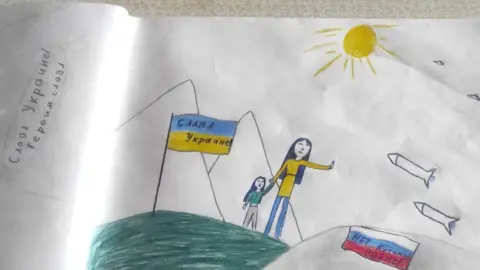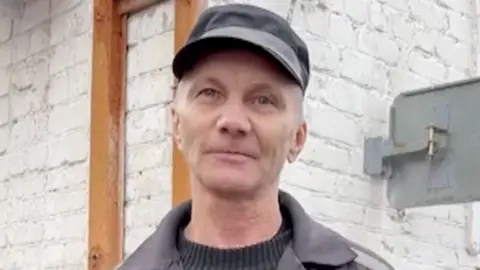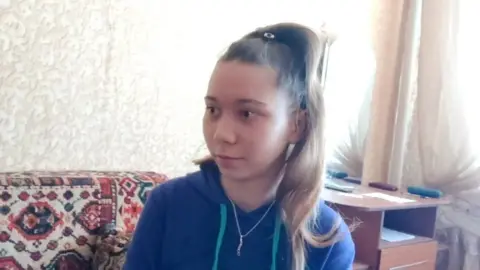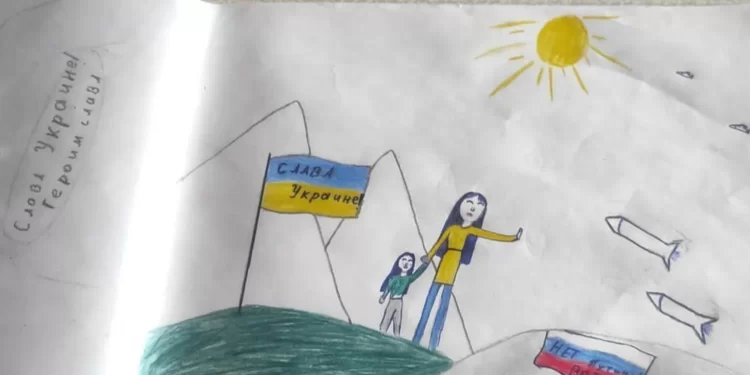 Olga Podolskaya
Olga PodolskayaA man who was detained in Russia after his daughter drew an anti-war picture – in a case that generated global headlines – has been released from a penal colony.
The drawing – featuring the phrases “No to war” and “Glory to Ukraine”, by Alexei Moskalev’s daughter Masha – was reported to the police in 2022.
He was later accused of repeatedly criticising the Russian army on social media and, in March 2023, sentenced to two years in jail for discrediting the army.
Footage shared online on Tuesday shows him after leaving the penal colony in the Tula region, and embracing his daughter, while still wearing his prison uniform. OVD-Info
OVD-Info
His release was reported by his lawyer from OVD-Info, Vladimir Biliyenko, the Russian human rights group said.
Moskalev described spending two months in a punishment cell while he was detained.
He said: “It was just a torture chamber. Just a torture chamber. First of all, the cell was two metres by one metre, do you understand what that is?
“At first, I was sitting alone, then they put a second person in. And the two of us were sitting in a cell measuring two by one meter.
“The floors were rotten, rats were everywhere, coming from the sewers and everywhere, huge rats.”
Russia’s federal prison service has not immediately commented, and has not replied to a request for comment from the Reuters news agency.
The family’s problems began back in 2022 after Masha, then 12, drew a Ukrainian flag in April with the words “Glory to Ukraine”, rockets and a Russian flag with the phrase “No to war!”
Moskalev said the school reported his daughter’s drawing to police. After that, he was fined for an anti-war social media post.
But after his flat was searched in December of that year he was charged under the criminal code because he had already been convicted of a similar offence.
Authorities separated Masha from her father and placed her into a children’s home, and later into the custody of her estranged mother.
Moskalev was sentenced to two years in jail in March 2023.
He did not attend the sentence hearing, having escaped house arrest to flee the country for neighbouring Belarus, OVD-Info said.
He was later detained and extradited back to Russia the following month, the organisation added.
Speaking to the BBC last year, the town councillor Olga Podolskaya said she was in “shock”.
“A prison sentence for expressing your opinion is a terrible thing. A two-year jail term is a nightmare.”
The case comes against a background of a severe deterioration of human rights in Russia since the full-scale invasion of Ukraine in February 2022, according to a recent UN report.
The investigation details police brutality, widespread repression of independent media and persistent attempts to silence Kremlin critics using punitive new laws.
Among the cases the report highlights is that of Artyom Kamardin, who was jailed for seven years for reading an anti-war poem in public – an act authorities deemed to be “inciting hatred”.
The report accuses the government of seeking to propagate its views on the Ukraine conflict among children via the introduction of mandatory school lessons, officially labelled as “important conversations”.
“Children refusing to attend such classes and their parents are subject to pressure and harassment,” it adds.






